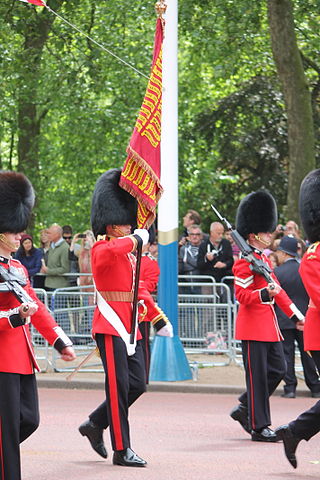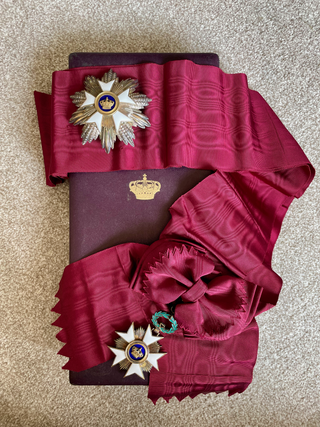
The Distinguished Service Order (DSO) is a military decoration of the United Kingdom, as well as formerly of other parts of the Commonwealth, awarded for meritorious or distinguished service by officers of the armed forces during wartime, typically in actual combat. Since 1993 it has been awarded specifically for 'highly successful command and leadership during active operations', with all ranks being eligible.
The Australian honours and awards system refers to all orders, decorations, and medals, as instituted by letters patent from the Monarch of Australia and countersigned by the Australian prime minister at the time, that have been progressively introduced since 14 February 1975. The Australian honours and awards system excludes all state and local government, and private, issued awards and medals.

The Royal Victorian Order is a dynastic order of knighthood established in 1896 by Queen Victoria. It recognises distinguished personal service to the British monarch, Canadian monarch, Australian monarch, or New Zealand monarch, members of the monarch's family, or to any viceroy or senior representative of the monarch. The present monarch, King Charles III, is the sovereign of the order, the order's motto is Victoria, and its official day is 20 June. The order's chapel is the Savoy Chapel in London.

In military organizations, the practice of carrying colours, standards, flags, or guidons, both to act as a rallying point for troops and to mark the location of the commander, is thought to have originated in Ancient Egypt some 5,000 years ago. The Roman Empire also made battle standards a part of their vast armies. It was formalized in the armies of Europe in the High Middle Ages, with standards being emblazoned with the commander's coat of arms.

The Order of the Crown is a national order of the Kingdom of Belgium. The Order is one of Belgium's highest honors.

The Order of Orange-Nassau is a civil and military Dutch order of chivalry founded on 4 April 1892 by the queen regent, Emma of the Netherlands.

The Royal Order of the Sword is a Swedish order of chivalry and military decoration created by King Frederick I of Sweden on 23 February 1748, together with the Order of the Seraphim and the Order of the Polar Star. The motto of the order is in Latin: Pro Patria.
The Rhodesian honours system was established at the time that Rhodesia unilaterally declared itself a republic in March 1970, when a system of military and civil decorations and awards was instituted by Presidential Warrant in November 1970.
South African orders, decorations and medals are those military and civilian orders, decorations and medals issued by the Government of South Africa. The following is a (non-exhaustive) list of these:

The Rhodesia General Service Medal was the most widely awarded military medal of Rhodesia. It was awarded to members of the security forces and British South Africa Police for service on operations undertaken for the purpose of combatting terrorists or enemy incursions into Rhodesia.
The South African Police Star for Distinguished Leadership was a high-ranking decoration, that existed between 1979 and 1986. It was reserved for senior police officers, and was awarded only twice. Recipients were entitled to use the post-nominal letters SED, standing for Stella Excellentis Ductus, the Latin form of the name.
The South African Police Cross for Bravery was a high-ranking decoration, that existed between 1963 and 2004. It initially had only one class, but it was expanded to three classes in 1988.
The South African Police Star for Outstanding Service was a decoration that existed between 1979 and 2004. Recipients are entitled to the post-nominal letters SOE, standing for Stella Officii Egregii, the Latin form of the name.
The Australian Police Medal (APM) is awarded for distinguished service by a member of an Australian police force. The APM was introduced in 1986, and replaced the Imperial King’s Police Medal for Gallantry and King’s Police Medal for Distinguished Service.

The National Police Service Medal (NPSM) is a special service award within the Australian honours system to provide "recognition for the unique contribution and significant commitment of those persons who have given ethical and diligent service as a sworn member of an Australian police service".

The Gallantry Cross, Silver, post-nominal letters GCS, was instituted by the President of the Republic of Venda in 1985, for award to all ranks for courage or bravery or valour beyond the normal call of duty.

The Distinguished Service Medal, Gold was instituted by the President of the Republic of Venda in 1985, for award to all ranks for exceptionally meritorious service and particular devotion to duty.

The Distinguished Service Medal, Silver was instituted by the President of the Republic of Venda in 1985, for award to all ranks for outstanding service and devotion to duty.

The Decoration for Merit in Gold, post-nominal letters DMG, was instituted by the President of the Republic of South Africa in April 1996. It was awarded to veteran cadres of Umkhonto we Sizwe, the military wing of the African National Congress, who had distinguished themselves during the "struggle" by outstanding service and utmost devotion to duty.

The Star of South Africa, Officer is the fourth-ranked decoration of five non-military classes of the Order of the Star of South Africa, a South African military order that was instituted by the Republic on 1 July 1975. The Order of the Star of South Africa was discontinued in 2002.













